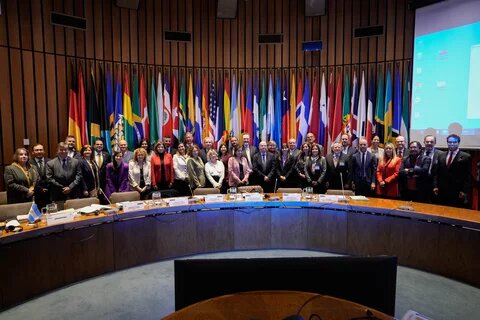From 13 to 14 September, representing the EU-LAC Foundation, Ernesto Jeger, Senior Programme Manager - Sustainable Development and Economic Issues, participated in the event "New Challenges and New Perspectives for International Cooperation: Approaches to Development from Latin America and the Caribbean" organised by The OECD Development Centre, the Economic Commission for Latin America and the Caribbean (ECLAC), the Chilean Agency for International Development Cooperation (AGCID) and the Inter-American Development Bank (IDB). The event was held at CEPAL Headquarters in Santiago, Chile.
The occasion gathered representatives of cooperation entities from Argentina, Chile, Costa Rica, Panama, Peru and Uruguay, as well as participants from different bilateral, regional and multilateral cooperation organisations to exchange on global partnerships for development. The two days of meetings took as their starting point the call for international development cooperation to go beyond traditional financial aid to include a new set of modalities, such as innovative knowledge-sharing instruments, multilateral policy dialogue, capacity building, technology transfers, blended finance and resource mobilisation. Since 2019, the EU-LAC Foundation has been collaborating with ECLAC, the OECD Development Centre and the European Commission to promote a dialogue with Latin American and Caribbean countries on new concepts of Development and Cooperation under the "Development in Transition" approach. In this regard, a fundamental objective of the event was to rethink multilateralism in order to adapt it to today's development challenges. Following this purpose, participants advanced the discussion based on five dimensions:
- Multidimensional measures of development and well-being;
- National strategies tailored to specific development challenges and opportunities and their contribution to regional and global and their contribution to regional and global public goods;
- 2030 Agenda for Sustainable Development with an emphasis on global public goods and shared challenges;
- Multilateralism re-founded: multilevel and multilateral governance, cooperation and multi-stakeholder cooperation;
- New EU-LAC partnerships: going beyond shared values; with an emphasis on employment generation, new sectors linked to the digital and environmental transitions and the role of the private sector.
With multilateralism being at the core of the work of the EU-LAC Foundation, Mr Jeger intervened together with Ewout Sandker, Head of Cooperation, European Union Delegation, Chile; José Antonio Sanahuja, Director, Fundación Carolina; Raúl García Buchaca, ECLAC Deputy Executive Secretary for Administration and Programme Analysis, and country representatives from Argentina, Chile, Costa Rica, Panama, Peru and Uruguay in the roundtable 4 “Renewing partnerships between the European Union and Latin America and the Caribbean”.
In his presentation, Mr Jeger emphasised the mission of the EU-LAC Foundation to promote the strategic partnership between the European Union, Latin America and the Caribbean via the active participation of their respective civil societies and therefore, the importance of hearing out different social actors on cooperation between both continents. In this regard, the Foundation recently organised the EU-Central America Dialogue Sessions, which promoted a multilateral debate on cooperation on issues such as green and fair digital transitions, natural disaster prevention and science and technology. To continue this process and in view of the prospects of a new summit of Heads of state and government from both regions in 2023, the EU-LAC Foundation plans to hold a series of thematic forums with social actors to ensure that their concerns and suggestions are taken into account and fed into the intergovernmental process.
This event in Santiago kicked off a series of working meetings throughout 2022 and 2023 that will gradually include other countries and regions to broaden the scope of the objectives and strengthen a common position at the international level. The initiative represented an important step for the EU-LAC Foundation and its partners towards rethinking multilateralism in order to adapt it to today's development challenges and to create new opportunities for partnerships and international cooperation.
